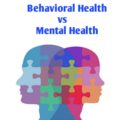What Is Mental Health?
Mental health includes our emotional, psychological, and social well-being. It affects how we think, feel, and act. It also helps determine how we handle stress, relate to others, and make choices. Mental health is important at every stage of life, from childhood and adolescence through adulthood.
Over the course of your life, if you experience mental health problems, your thinking, mood, and behavior could be affected.
Multiple social, psychological, and biological factors determine the level of mental health of a person at any point of time. For example, violence and persistent socio-economic pressures are recognized risks to mental health. The clearest evidence is associated with sexual violence.
Poor mental health is also associated with rapid social change, stressful work conditions, gender discrimination, social exclusion, unhealthy lifestyle, physical ill-health and human rights violations.
There are specific psychological and personality factors that make people vulnerable to mental health problems. Biological risks include genetic factors.
- Biological factors, such as genes or brain chemistry
- Life experiences, such as trauma or abuse
- Family history of mental health problems
Mental health problems are common but help is available. People with mental health problems can get better and many recover completely.
Early Warning Signs
Not sure if you or someone you know is living with mental health problems? Experiencing one or more of the following feelings or behaviors can be an early warning sign of a problem:
- Eating or sleeping too much or too little
- Pulling away from people and usual activities
- Having low or no energy
- Feeling numb or like nothing matters
- Having unexplained aches and pains
- Feeling helpless or hopeless
- Smoking, drinking, or using drugs more than usual
- Feeling unusually confused, forgetful, on edge, angry, upset, worried, or scared
- Yelling or fighting with family and friends
- Experiencing severe mood swings that cause problems in relationships
- Having persistent thoughts and memories you can’t get out of your head
- Hearing voices or believing things that are not true
- Thinking of harming yourself or others
- Inability to perform daily tasks like taking care of your kids or getting to work or school
How to Promote and Protect Mental health
Mental health promotion involves actions that improve psychological well-being. This may involve creating an environment that supports mental health.
An environment that respects and protects basic civil, political, socio-economic and cultural rights is fundamental to mental health. Without the security and freedom provided by these rights, it is difficult to maintain a high level of mental health.
National mental health policies should be concerned both with mental disorders and, with broader issues that promote mental health. Mental health promotion should be mainstreamed into governmental and nongovernmental policies and programmes. In addition to the health sector, it is essential to involve the education, labour, justice, transport, environment, housing, and welfare sectors.
Specific ways to promote mental health include:
- early childhood interventions (e.g. providing a stable environment that is sensitive to children’s health and nutritional needs, with protection from threats, opportunities for early learning, and interactions that are responsive, emotionally supportive and developmentally stimulating);
- support to children (e.g. life skills programmes, child and youth development programmes);
- socio-economic empowerment of women (e.g. improving access to education and microcredit schemes);
- social support for elderly populations (e.g. befriending initiatives, community and day centres for the aged);
- programmes targeted at vulnerable people, including minorities, indigenous people, migrants and people affected by conflicts and disasters (e.g. psycho-social interventions after disasters);
- mental health promotional activities in schools (e.g. programmes involving supportive ecological changes in schools);
- mental health interventions at work (e.g. stress prevention programmes);
- housing policies (e.g. housing improvement);
- ·violence prevention programmes (e.g. reducing availability of alcohol and access to arms);
- community development programmes (e.g. integrated rural development);
- poverty reduction and social protection for the poor;
- anti-discrimination laws and campaigns;
- promotion of the rights, opportunities and care of individuals with mental disorders.
Mental health care and treatment
In the context of national efforts to develop and implement mental health policy, it is vital to not only protect and promote the mental well-being of its citizens, but also address the needs of persons with defined mental disorders.
Knowledge of what to do about the escalating burden of mental disorders has improved substantially over the past decade. There is a growing body of evidence demonstrating both the efficacy and cost-effectiveness of key interventions for priority mental disorders in countries at different levels of economic development. Examples of interventions that are cost-effective, feasible, and affordable include:
- treatment of depression with psychological treatment and, for moderate to severe cases, antidepressant medicines;
- treatment of psychosis with antipsychotic medicines and psychosocial support;
- taxation of alcoholic beverages and restriction of their availability and marketing.
A range of effective measures also exists for the prevention of suicide, prevention and treatment of mental disorders in children, prevention and treatment of dementia, and treatment of substance-use disorders. The mental health Gap Action Programme (mhGAP) has produced evidence based guidance for non-specialists to enable them to better identify and manage a range of priority mental health conditions. SEE:10 Things You Should Know About Mental Health Illnesses and Problems






